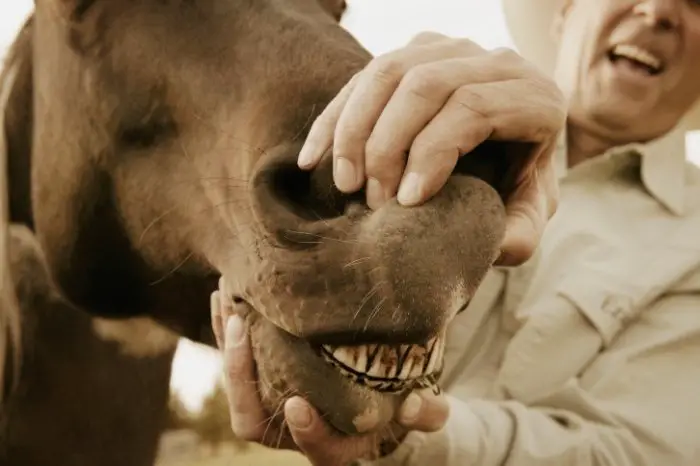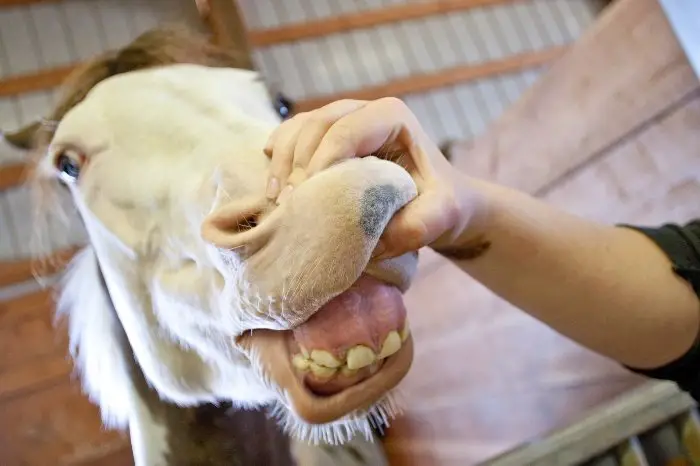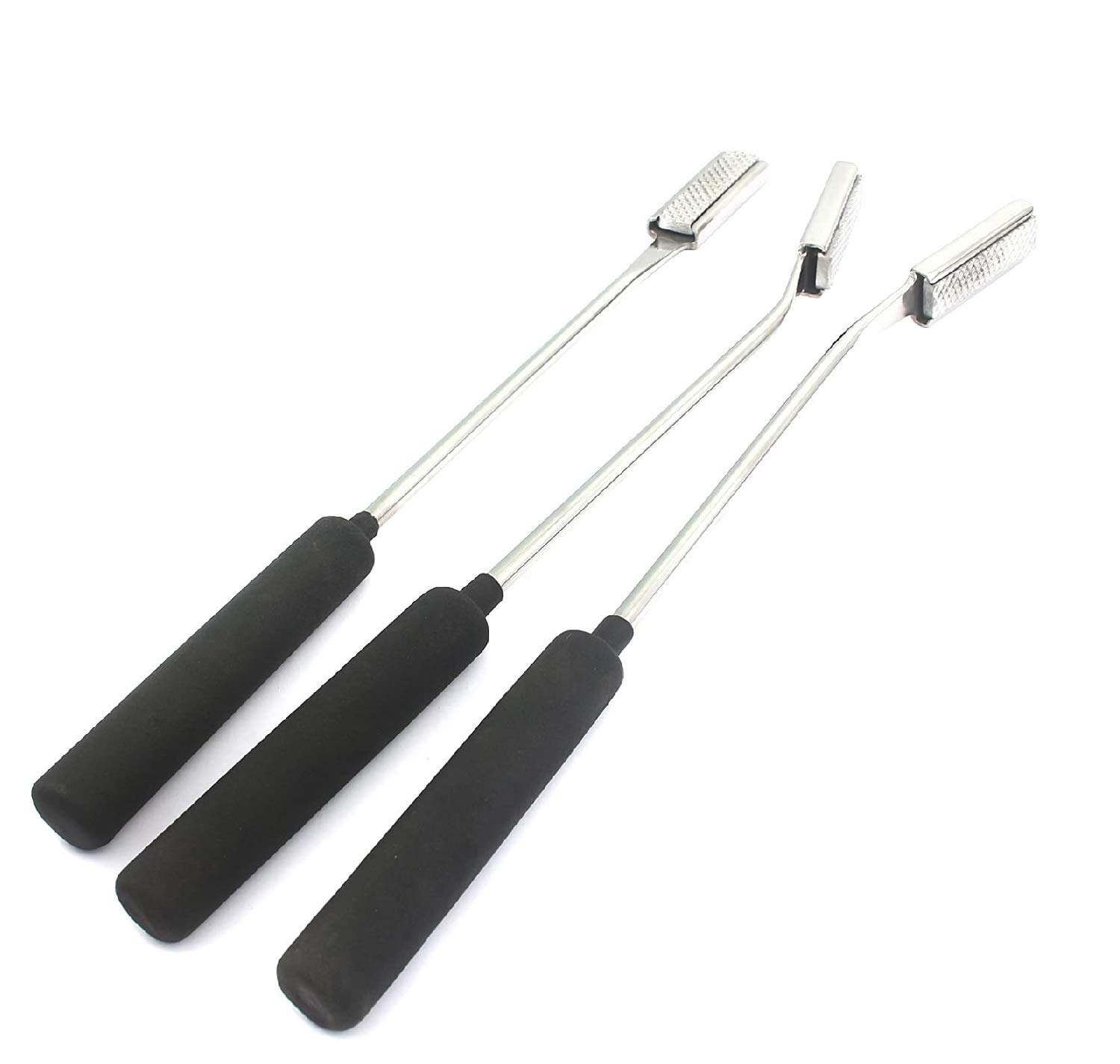Last Updated on February 24, 2023
Horses have many routine healthcare needs, and floating their teeth is one of them. But is doing your own horses teeth a good idea, or do you need a professional to do this job?
Horse dental care is an essential and complex part of owning a horse and should be taken seriously. Your horse will eat a huge amount of food every day, and his teeth need to be in the best possible shape to cope with this! So, if you’re tempted to save some money by doing your own horses’ teeth, let’s find out if this is a good idea.
Horse Dentition Explained
Horses are grazing animals that have evolved to be able to chew and digest huge amounts of food each day. These magnificent animals are herbivores, and in the wild, they would spend many hours each day grazing on tough grasses. Our domesticated horses have a similar diet to their ancestors, except we supplement their diet with hay and cereals.
Horse dentition is able to cope with eating so much roughage because of the anatomy of the teeth. The adult teeth of a horse are very long, but most of each tooth is hidden within the skull.

As your horse grazes he gradually wears the grinding surface of the tooth down. To compensate for this, each tooth erupts a little at a time over the lifetime of the horse. It is not until the horse gets very old that they start to run out of tooth, and they begin to fall out!
Why Do Horses Need Their Teeth Floating?
In a healthy horse, the surface of each tooth meets exactly with the one opposite. This, combined with the chewing action of the horse, means that each tooth is worn down evenly.
However, in domesticated horses, it is unfortunate that they commonly encounter dental problems. This is because of changes we have made to their diet compared to feral and wild horses.
A wild horse would have its head down all day, grazing on the grass that grows on the ground. We have substituted this with hay, which is often fed in hay racks raised off the floor. When a horse chews with its head raised the teeth may not be perfectly aligned, and abnormalities can occur.
Another problem with domesticated horses is that we have changed the type and amount of food that they eat. Their food is easier to chew and digest, and does not wear down the teeth in the same way. Basically, by giving our horses the best food and living conditions, we might cause problems with the teeth!
These dental issues are normally caused by the teeth wearing down unevenly. To compensate for this, a routine dental examination should be carried out.
If your veterinarian or equine dental technician finds that the teeth are not wearing away normally, they may rasp off any overgrowths. This is done using a manual or powered rasp and is called floating.
Click Here to Learn about:
What Happens If You Don’t Float A Horse’s Teeth?
If a horse’s teeth are not floated, it is very likely that any abnormalities will become worse. Dental abnormalities in horses teeth include:
- Long sloping overgrowth of the teeth, also known as ramps
- Hooks on the teeth at the front or back of the mouth
- Large overgrowth of a tooth where the opposite tooth is missing
- An abnormal sloping angle of the grinding surface of the tooth
- Sharp points on the sides of the cheek teeth, that can rub the inside surface of the mouth
If your horse has any of these problems, they will be identified on a routine dental examination. A treatment plan would be put in place, that normally involves floating the horses’ teeth. More serious problems may need extensive veterinary treatment.
With any dental problem in horses, the longer it is left the worse it will get. Your horse may have a small hook or ramp that can be corrected with one session of floating. If left untreated, within a year it will be much worse.
DDP Set of 3 Equine Dental Float RASPS Down UP Straight Veterinary
How Do You Float A Horse’s Teeth At Home?
Floating a horse’s teeth is normally carried out by a veterinarian or an equine dental technician. This procedure can be carried out a home, as all of the necessary equipment is portable. This means that your horse does not have to be transported to a clinic to have his teeth floated.
You will need a sheltered dry area for the dental professional to work, and they may need access to an electrical power socket. Many horses need to be sedated to have their teeth floated, so you will need a stable for them to recover in afterward.
Can I Float My Horses Teeth Myself?
Floating a horse’s teeth is a very complex and intricate procedure, and should only be undertaken by a trained professional. They will know how to recognize and treat any dental problems that might occur in your horse’s mouth.
If a horse’s teeth are floated by an untrained person, they may cause considerable harm. A problem may be missed or treated incorrectly, causing severe pain to the horse. In the long term, the horse may need even more dental treatment to correct the problem.
The tools used to float a horse’s teeth can also injure the mouth if used incorrectly. The rough surface of the rasp might catch on the sensitive skin inside the cheeks, leading to sore areas and ulcers. It is also normally necessary to sedate a horse to have its teeth floated, and you may need a veterinarian to do this.

Summary
So, as we have learned, it is not a good idea to attempt to float your own horse’s teeth. It takes many years to train as an equine dental professional, as they need to be able to diagnose and treat many different dental problems. An untrained person may fail to notice a problem, or even make an abnormality worse.
We’d love to hear your thoughts on equine dental care! Who do you prefer to do your horse’s teeth – your veterinarian or an equine dental technician? Have you come across problems caused by someone floating their own horse’s teeth? Leave a comment below and we’ll get back to you!

Kate Chalmers is a qualified veterinary nurse who has specialized in horse care for the vast majority of her career. She has been around horses since she was a child, starting out riding ponies and helping out at the local stables before going on to college to study Horse Care & Management. She has backed and trained many horses during her lifetime and competed in various equestrian sports at different levels.
After Kate qualified as a veterinary nurse, she provided nursing care to the patients of a large equine veterinary hospital for many years. She then went on to teach horse care and veterinary nursing at one of the top colleges in the country. This has led to an in-depth knowledge of the care needs of horses and their various medical ailments, as well as a life-long passion for educating horse owners on how to provide the best possible care for their four-legged friends.
Kate Chalmers BSc (Hons) CVN, Dip AVN (Equine) Dip HE CVN EVN VN A1 PGCE


